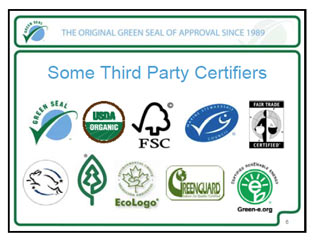Green Standards Drive Innovation
Creating standards that raise the bar for suppliers is a proactive approach to promoting our goals towards zero waste.
With the issuance of Green Standards comes the question of authenticity of product and packaging claims.
Current developments in the areas of specifications, claims, third party certifiers, materials collections and processing, and new product and packaging innovations are moving forward rapidly.
Be Informed: Research it… Promote Innovation… Engage Relevant Participants
Edutainment
Materials Background for Packaging Standards
|
Greenwashing: Misleading Environmental Claims on ProductsGreen-wash (verb: the act of misleading consumers regarding the environmental practices of a company or the environmental benefits of a product or service. Original file location:http://youtu.be/_D2_IM7isw8 |
 |
Third Party CertificationThe Six Sins of Greenwashing Institute for Market Transformation to Sustainability (MTS) |
FTC Green Guides Compliance
Below is a brief summary of some key provisions of the revised Green Guides:
Claims. Claims must be truthful and not misleading (e.g., does a claim apply to the product or the packaging or does a comparative claim apply to a prior version or a competitor). Claims must be supported by proper substantiation.
Disclosures. Disclosures must be clear, prominent, and understandable.
General Environmental Benefit Claims. General environmental benefit claims (e.g., “eco-friendly” and “environmentally friendly”) must not be used, unless accompanied by qualifying language that limits the claim to a specific benefit.
Carbon Offsets. Carbon offsets must be properly calculated and must not be based on reductions required by law. If emissions reductions will not occur for two years, that must be disclosed.
Certifications/Seals of Approval. Unqualified certifications and seals (e.g., “GreenLogo” or “EarthSmart”) must not be used. Certifications and seals must convey a specific, limited benefit. Material connections between the granting organization and the marketer (e.g., membership, in-house seal) must be disclosed. For instance, where an "EarthSmart" seal�known for certifying products' chemical emissions- is placed on product packaging, the use of the seal would be considered deceptive unless the marketer displays appropriate qualifying language, such as "EarthSmart certifies that this product meets EarthSmart standards for reduced chemical emissions during product usage."
Compostable. A compostable product must break down into usable compost in a safe and timely manner (i.e., about the same time as the materials with which it is composted). If compositing is limited to municipal composting facilities, or if municipal composting is not available to a substantial majority (60%) of communities where the product is sold, that must be disclosed.
Degradable. Degradable claims may not be made for products that are customarily disposed of in landfills, incinerators, or recycling facilities, but will not biodegrade in those conditions within one year. Degradable claims should only be made for products that will completely break down and return to nature within one year after customary disposal. Accordingly, the “biodegradable” claim should not be used on disposable plastic products sold in our stores. Companies may still make biodegradable claims if the product will break down into elements found in nature in greater than a year, but those claims must be qualified by stating how long it will take the product to completely decompose after customary disposal. If customary disposal is via landfill, as is the case for much of America’s solid waste, an appropriate qualification would need to state that decomposition could take decades, if not centuries.
Free-of. Products advertised as “free of” a substance must not have other substances that cause similar harms. “Free of” claims must not be made for substances never associated with the category.
Non-Toxic. Products advertised as “non-toxic” must be non-toxic for both humans and the environment.
Ozone Safe/Ozone Friendly. Products must not be advertised as “ozone safe” or “ozone friendly” if they cause any harm to the ozone layer or the atmosphere.
Recyclable. Products marketed as “recyclable” must be able to be collected through an established recycling program. If recycling facilities are not available to a substantial majority of communities where the product is sold, the limitations must be disclosed (based on the level of availability).
Recycled Content. Recycled content claims must be based on content that is recovered or diverted from the solid waste stream. When only partially made of recycled material, the percentage, by weight, of recycled material must be disclosed.
Refillable. Refillable claims must not be made unless the marketer provides the means for refilling the package.
Renewable Energy. Unqualified renewable energy claims must not be made where fossil fuels are used during the manufacturing process. Renewable energy claims must specify the source(e.g., wind or solar energy). “Made with renewable energy” means all or virtually all of the significant manufacturing process is powered with renewable energy. For example, the proposed revisions state that where a marketer generates renewable energy but sells all of the associated RECs, the marketer cannot "double count" by also advertising that it uses renewable energy or that it "hosts a renewable energy facility."
Renewable Materials. Renewable materials claims must specify the material used, how the material is sourced, and why the material is renewable. “Made with renewable materials” means that it is made entirely (excluding minor, incidental components) with renewable materials.
Source Reduction. Source reduction claims must be qualified as necessary to avoid deception about the amount of the reduction or the basis for the comparison.

